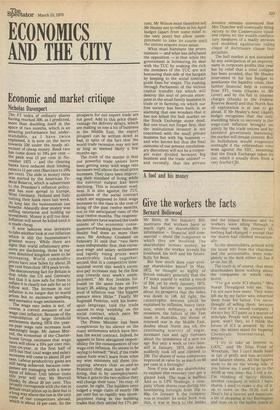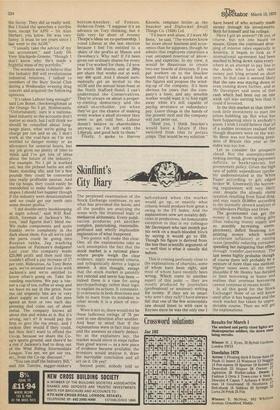A fool and his money
Give the workers the facts
Bernard Hollowood
Mr Benn, in his Industry Bill, maintains that workers have as much right as shareholders to information — financial and commercial — about the companies in which they are involved. The shareholder invests money, he says, while the worker invests his livelihood, his skill and his future. Bully for Benn.
But how much does your average shareholder know? In May, 1972, he thought so highly of British industry generally that the FT index soared to within a touch of 550, yet by early January, 1975, he had become so pessimistic about its prospects that the index was down to 146. All right, the catastrophic descent could be explained by inflation, heavy taxation, union militancy, a world recession, the failure of the Test team in Australia, the threat of renewed war in the Middle East, doubts about North Sea oil, the continuing scarcity of sugar, incessant rain and ugly rumours about the imminence of a new ice age. • But only a week or two later, still in January, 1975, the index suddenly took off and climbed to 250. The shares of some companies improved in value by as much as 60 per cent in a fortnight!
Now if you ask any shareholder to explain this recovery you get a glazed look. The man is baffled. And so is UPS Holdings, a company whose shares rose during the bewildering fortnight from 35p to 60p. On January 8, the company was in trouble: its order book was thin, it was in hock to the banks and the Inland Revenue and its workers were idling through a three-day week. By January 25, nothing had changed — except that the shares had climbed sensationally.
So the shareholders, primed with the latest info from the chairman and the accountants, were completely in the dark either on Jan 8 or on Jan 25.
The truth is, of course, that most shareholders know nothing about the companies in which they invest. . .
"I've got some ICI shares," Mrs Norah Threadgold told me, "but I'm not sure how many. They were left me by my father who inherited them from his father. I've never thought of selling them, because I'm sure it's a sound company. I always buy ICI paint as a matter of principle. People will always need paint, won't they, so I think the future of ICI is assured. By the way, the letters stand for Imperial Chemicals International, I believe."
"I try to take an interest in GKN," said Mr Silas Pond of Wrexham, "but I can't made head or tail of profit and loss accounts and balance sheets. All the figures seem to be on the wrong side, if you follow me. 1 used to go to the AGM at one time. No, I tell a lie, I'm thinking of Savoy Hotels, another company in which I have shares. I used to make a day of it: up to town on the 10.20, call at Maxi's for a haircut and manicure, a bit of shopping at the Burlington and then on to the buffet lunch at the Savoy. They did us really well. But I found the speeches a terrible bore, except for APH — Sir Alan Herbert, you know. He was very funny. It must be ten years since I last went to the AGM."
"I usually take the advice of my tax accountant," said Lady De Vere Stackpole-Greene, "though I don't know why. He's made a frightful mess of my portfolio."
The workers seem to believe that the Industry Bill will revolutionise industrial relations. I talked to members of the Bury Social Club during a Wednesday evening drag concert and acquired the following opinions.
"It's taken Labour long enough!" said Len Bonet, checkweighman at the Orange No 3 pit, Holmecastle. "Unfortunately, ours is a nationalised industry so the accounts don't matter so much, but I still think we should be consulted about longrange plans, what we're going to charge per ton and so on. I don't work at the coal-face so I'm not entitled to danger money or an allowance for unsocial hours, but my job gives me plenty of time to think and I've got lots of ideas about the future of the industry. For example, No 1 pit is worked out, but the pithead baths are still there, standing idle, and for a few pounds they could be converted into really profitable saunas. And the tip heaps, they could easily be remodelled to make fantastic skislopes. [should feel happier though if the industry were denationalised and we could get our teeth into some decent profits."
"I did double-entry bookkeeping at night school," said Wilf Redditch, foreman at Jackson's Motors, "and figures don't blind me. We make components and quite frankly we're completely in the dark about them. For all we're told the parts could be going into Russian tanks, Jap washing machines or Patmore's dodgems! Last year the company made £25,000 profit and then said they couldn't afford a pay increase of 17 per cent. Ridiculous. As Tony Benn says, we've invested our lives with Jackson's and we're entitled to know what's going on. Take the vending machines. We pay a tanner a cup of tea, coffee or soup and we have no say in the price. Now the old sixpenny bits are in very short supply so most of the men spend an hour or two each day pressing dud coins out of sheet metal. The company knows all about this and winks at it. But it's wrong, isn't it? It would pay the firm to give the tea away, and I reckon they would if they could, but they don't want to offend the Co-op, because we share the Coop's sports ground, and there'd be a riot if Jackson's had to drop out of the West Riding Intermediate League. You see, we get our tea, etc., from the Co-op, discount."
"You can stuff the Industry Bill,". said Jim Tontine, sagger-maker's
bottom-knocker, of Fenton, Stoke-on-Trent. "I suppose it's an advance on Tory thinking, but it falls very far short of Jeremy Thorpe's ideas on co-partnership. I voted Liberal at the last election because I feel I'm entitled to a share of the profits at Mason and Dewsbury's. Why not? If I'd been given ten ordinary shares for every year I've worked for them, I'd now be worth 160 shares, and at 260p per share that works out at well, say 400 quid. And I should automatically get an invited to the AGM and the annual bean-feast at the North Stafford Hotel. I can't understand the Conservatives. They're always on about a property-owning democracy and the small shareholder, yet when they've got the chance of making every worker a small investor they seem to get cold feet. Labour doesn't believe in shareholders anyway, so I'm left with the Liberals, and good luck to them."
Filially, I spoke to Harvey Knowle, template fettler at the Snacker and Diplocket Small Things Co. (1928) Ltd.
"I'd leave well alone, if I were Mr Berm," he said. "The workers know far more about business and economics than he supposes, though he admits that employees constitute a vast untapped reservoir of knowhow and expertise. In my view, it would be disastrous to create two-tier boards of directors. If you put workers on to the Snacker board they'd take a quick look at the figures and propose the winding-up of the company. It's been obvious for years that the company's a loser, and any sensible worker would want it to fold right away while it's still capable of paying severance or redundancy pay. Leave things in the hands of the present mob and the company will just peter out.
"Mind you, I think Snacker's would have a future if they switched from tiles to potato crisps. That would be my solution,"



































 Previous page
Previous page